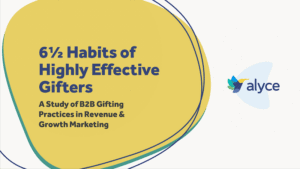What Is Personal Experience?
Personal Experience (PX) is the approach that prioritizes creating and strengthening personal bonds throughout the customer journey by transforming one-to-many touches into one-to-one moments driving sustainable business growth.
Imagine this scenario: About two to three times a week, you visit a local coffee shop around the corner from your office. You - a creature of habit - always get the same thing: a medium cold brew, black.
Every time you enter you are greeted by one of two baristas. Barista #1 greets you with a warm smile, asks you what you’re having and for your name. Barista #2 also greets you with a warm smile, but knows your name, has your order already made, and asks after your newly adopted dog, Milo.
In both cases, you’ve had a pleasant trip and walked out of the shop with a coffee in your hand, but there’s a key difference between the experience each barista is delivering. Let’s take a closer look:
Barista #1
Greets you with a smile, asks for your order and your name, and you leave with your coffee. This experience is transactional. The barista delivers the same delightful end-to-end customer experience to everyone they serve.
Barista #2
Greets you with a smile, knows your name, your order, has that order ready for you, and knows that you recently adopted a dog. This experience is interactional. This barista delivers a meaningful end-to-end personal experience unique to you.
As this example shows, the subtleties in the interactions you have with your customers make a big difference. Transactional experiences are surface level and they’re much more inclined to fulfill their needs with another vendor. Create a bond with them that’s rich with a personal connection and your customers will be loyal and even tell others about your business.
The key to creating sustained growth for your company is to create a Personal Experience ( PX ), one that translates into repeat and net new business over time by building rapport, earning trust and driving loyalty.
What Is Personal Experience?

Personal Experience (PX) is the approach that prioritizes creating and strengthening personal bonds throughout the customer journey by transforming one-to-many touches into one-to-one moments driving sustainable business growth.
Why Personal Experience
is so Important
In 1984, only 8.2% of households had a computer. Without technology being readily available to most conducting business in this decade, they instead relied on building rapport and fostering one-to-one relationships in the field. This “Relationship Era” of the 1980s was characterized by sellers earning trust and loyalty by meeting face-to-face which resulted in customers working with businesses they knew and liked.
Jump ahead to 1994, and the number of households with a computer more than doubled to 22.9%. The technology of the 90s ushered in the “Smile and Dial” era. Sales forces were now held accountable to activity-based metrics such as number of calls made and number of conversations had in a day. The selling landscape relied less on the personal touch and became a numbers game where most companies could get their foot in the door using a generic pitch.
Only six years later, in 2000, ( the year the camera phone was invented ), the number of households with a computer once again more than doubled to 56.3%. The accessibility to emerging hardware and supporting software shepherded us into the “Automation Era” where anything was possible. We could now reach out to as many people as our imagination allowed with the push of a button. Over time and with intensity, this activity put an impersonal buffer between us and our prospects.
In opting to scale the quantity of our outreach, we sacrificed the buyer’s experience on the altar of efficiency: disregarding who they were and what they cared about.

The increased usage of automation to sell and market to our audiences in the last 20 years has now created a nearly impenetrable cacophony in the marketplace. Prospects that were already hard to reach, are now downright elusive.
Our attempts at driving growth have diluted the quality required to genuinely connect with buyers and deliver value from the way we interact.
Always Be Personal
The only authentic way to create lasting and meaningful connections with your customers is to Always Be Personal, like Barista #2. While personalization gets us closer to the persona, Personal Experience brings us closer to the person.
Being personal favors quality in connection over mere quantity. In the competitive landscape, every deal and every customer matters, so the approach you take to building relationships is the difference between sustainably growing your business and stagnation.
The Personal Experience Approach

People don’t care what you know until they
know you care.
— Theodore Roosevelt
The Personal Experience ( PX ) approach means transforming as many one-to-many interactions as possible, into one-to-one moments. PX requires a fundamental shift to care about the person behind the persona. The person - with unique interests, passions, and pursuits beyond their 9:00 am to 5:00pm job titles and corporate logos - lives in the activities they enjoy from 5:00 pm - 9:00 am.
To appeal to the emotional motivations during the buying process, we must build and maintain relationships by appealing to the potential customer’s 5-to-9 interests, not just their 9-to-5 responsibilities. Only by building and maintaining relationships through a person’s 5-to-9 do we deliver an experience that is truly personal.
The Personal Experience (PX) approach starts with examining the collection of interactions a company has with their customers and prospects throughout the customer journey. Once identified, these one-to-many touches should be transformed into one-to-one personal moments at scale.
What is a Moment?
A moment is an interaction between two people when an emotional resonance is created by being Relevant, Relatable, and Respectful.
Calling these interactions “moments” - in lieu of traditional terms such as “touchpoint” - orients the objective of our connection: to create and solidify bonds with our audiences. Personal experience moments are defined by the 3Rs.
The Three Rs of Personal Experience:
Relatable, Respectful, and Relevant
A Personal Experience moment can be created by exercising the Three Rs: Relatable, Relevant and Respectful.
relatable
relevant
respectful
relatable The 5:00 pm - 9:00 am
Being Relatable is about what you say. By taking the time to ask, listen and learn about someone’s interests and passions, it’s easier to establish a personal bond. This ability to bring your whole selves into the conversation fosters a shared understanding through similarities you each share. Relatability builds rapport and serves as the foundation for earning trust.
Questions to ask yourself as you build moments that are Relatable:
What is your audience passionate about?
What are their priorities in their non-work life?
What do they spend their time doing or pursuing from 5:00 pm - 9:00 am?
How are this person’s passions acknowledged?
Have you built a bond based on mutual affinities?
How does someone’s #5to9™ influence the way they operate in their 9-to-5?
relevant The 9:00 am - 5:00 pm
Being Relevant is about when you connect. The timing of your communication, relative to the needs of the other person in their Customer Journey, is important. Focus on intent signals to find the right moment to provide information that earns trust during their research.
Questions to ask yourself as you build moments that are Relevant:
What’s important to your audience right now in their role?
What are the priorities of their organization?
What are their goals, their challenges, and their measurements of success?
Where is your current relationship at ( ie, demonstrating value, contract renewal, etc. )?
What information was discovered in your last conversation with them that can help inform the timing of your next moment?
respectful
Being Respectful is about how you connect. The way you interact with someone has a deep and lasting impact on your ability to build rapport, earn trust, and drive loyalty. Always lead with empathy by following the “Golden Rule:” Treat others the way you want to be treated.
Questions to ask yourself as you build moments that are Respectful:
Am I being as buyer-centric as possible? What’s in it for them?
Has empathy been built into this moment?
Is the tonality appropriate for the situation?
If I were on the receiving end of this moment, how would it make me feel?
Am I mirroring their disposition?
Am I using the right modality to communicate with this person?
Are you engaging when it’s optimal for them, or for yourself?
If done right, adopting the Personal Experience approach will allow your business to Build Rapport, Earn Trust, and Drive Loyalty repeatedly throughout the Customer Journey.
The Personal Experience Flywheel

We must never lose our sense of urgency in making improvements. We must never settle for “good enough,” because good is the enemy of great.
— Tony Hsieh, CEO of Zappos “Delivering Happiness”
The Personal Experience Flywheel represents a strategy to create sustainable business growth for companies looking to efficiently Build Rapport, Earn Trust, and Drive Loyalty throughout a Customer’s Journey.
Better known for its role in machinery, Jim Collins introduced the concept of the flywheel as an energy-efficient means to using your loyal customers as a self-sustaining engine of growth. While every business will design their flywheel differently, the efficiency of a company’s flywheel is always dependent on three main variables: Size, Speed, and Friction.
The size and speed of your flywheel will depend largely on your business model and the way your company is structured. Friction, however, is largely dependent on what type of interactions you’re delivering throughout a Customer’s Journey to Build Rapport, Earn Trust, and Drive Loyalty.

The Customer Journey is a vast collection of interactions spanning many channels. Bad interactions introduce friction, reducing your speed and efficiency. Conversely, good interactions ‘grease the wheel’ and help the business build self-sustaining momentum
Personal Experience puts people at the center of your business to reduce friction.
Using Personal Experience to create moments throughout the Customer Journey has a compounding or propellant effect on your flywheel. The more personal your moments, the less friction on your flywheel, and the more likely people will want to start working with you, keep working with you, and tell other people about how incredible it is to work with you.
Simply put: the closer you get to the people you do business with, the better business you’ll do.
The Difference Between
Personal and Personalization
Gartner classifies personalization as:
“The use of individual behavioral data ( eg, demographics, browsing history ) to target and/or tailor messages based on their likely in-the-moment needs.”
That is to say, personalization is a transactional tactic that relies on the concept of persona development – basically, using aggregated data to formulate a fictional picture of your individual prospects and customers – to move them through the various phases of their journey.
Personalization pushes the rational benefits of our products by introducing transaction, what most call a touchpoint - or touch - into the customer's journey at what is most likely the right moment to serve demographically tailored messaging for the developed personas.
However, this tactic doesn’t consider key contextual variables (individual variables) not linked to data that might be important to consider in a touch. And the loss of these key contextual variables can be counterproductive to the forward progress or formation of the relationship. In fact, it can have a strong adverse effect when things go wrong.
One of the most infamous stories of personalization gone wrong, happened to Shutterfly in 2014 when the company sent an email to some customers congratulating them on the birth of their new baby. This well-meaning campaign - intended to offer a new commemorative product to customers welcoming new additions to the family - ended up being sent to many people in situations where this attempt at personalization was not only inaccurate, it was insensitive and hurtful. Several on the receiving end of this campaign of this were struggling with infertility and miscarriages, leaving them “sad & angry” as their personal circumstances did not meet the criteria to which personalization and data had alluded.
This is just one of many situations where personalization has caused an irrelevant, insensitive, and unrelatable experience for consumers. In fact, it is estimated that mishaps with personalization in 2016 caused roughly $756 billion in damages for US-based companies and $2.5 trillion globally.
With personalization falling flat on delivering the most optimal experience, being personal means speaking to the right person, at the right time, and focusing on the right thing. Them.
Person is not the same as Persona
Automation and efficiency require unique segmentation tactics to produce mass messaging. Persona development brought the essence of real people into a fictional representation of your target buyer to weave generalities into the way we develop our products, identify ideal customer profiles, and determine core value propositions. Personas allowed the messaging about our brand, products, and services to resonate with the needs of a large share of the core audience. They aligned our organizations around an ideal customer profile, which offered businesses a higher probability of returning the investment made into marketing and selling to them. This approach, still optimized for efficiency and scale, ushered in the status quo of “one size fits most.” Which sounds a lot like settling for, ‘good enough.’
But, as Zig Ziglar once said,

People don’t buy for logical reasons.
They buy for emotional reasons.
Persona-based efforts emphasize the rational benefits our products offer a marketplace. Rational benefits, based on a prospect or customers role and responsibilities, only go so far to incentivize the desired behaviors in consumers. Especially in a world where features and functions are very quickly commodified.
If persona-based activities appeal to logic-based reasoning, then person-based activities appeal to deeper, more resonant emotion-based reasoning.
Being Personal Drives Consumer Behavior
Let’s take a closer look at consumer behavior using one of the most influential modalities of direct response advertising: video advertising.
YouTube, with a reported 200 billion monthly users worldwide ( up from 1.8 billion in May 2018 ), calculates that viewers are consuming 1 billion hours of videos daily. Thanks in large part to YouTube’s predictive algorithm, viewers are now watching more video content than they ever have. With audiences of that size consuming more content for a longer duration of time, it’s no surprise that YouTube has estimated $5.5 billion dollars will be spent on advertising in 2020 - in the US alone.
As the viewership has increased, so too have the completion of video ads. Experts now state that the viewed-to-completion rate of video ads is up 30% in the last 3 years to a whopping 89%. However, upon closer inspection, click-through-rates have not mirrored that same trend and have continued an overall pattern of decline for the past four years.
Click-through rates ( CTRs ) on video ads have continued an overall pattern of decline for the past four years and in 2019, CTRs reached an all-time low of only 0.16%.
This means that persona-based video ads are not driving action and that the depreciating ROI from our video ads, in the face of increasing viewership means the problem with video ads is not with the channel - the problem is with the approach.
Personal Experience: The Missing Link to Customer Experience
There’s no denying that the emphasis on Customer Experience ( CX ) over the past decade has moved the needle in the right direction for both consumers and brands. The shift to focus on CX has not come without benefits. 36% of businesses at the forefront of CX say they have significantly exceeded their top business goals.
This is due to the fact that, in today’s economy with ample options available across the majority of markets, the experience you deliver to your prospects and customers is paramount. Marketers are well aware of this shift in the marketplace; 81% say they’re competing mostly - if not solely - on the basis of CX.
But is it enough? With the competition closing in on features, function, and service offerings, how do you differentiate the experience you’re delivering to your customers? You get personal.
If Customer Experience (CX) is the product of the persona-based, one-to-many ‘touches’ between a company and a customer over the lifetime of their engagement, then Personal Experience (PX) is the transformation of those ‘touches’ into one-to-one moments throughout their journey.
The traditional model treats your prospects and customers as numbers as they progress through a funnel and gives them little to no incentive to repeat business with or refer new business to you post-transaction. Personalized moments introduce friction to your flywheel depressing acquisition and increasing churn.
Delivering Personal Experiences to your prospects, customers, and partners flips that model on its head and cuts a path to efficient, sustainable growth.
Personal Experience
and Alyce
Alyce is an AI-powered gifting platform that helps sales and marketing teams create personal bonds with their prospects, customers, and partners through one-to-one gifting. This unique approach creates relatable, relevant, and respectful outreach that appeals to the person behind the persona to build rapport, earn trust and drive loyalty.
Personal Experience
and Alyce
Alyce is an AI powered Personal Experience Platform that helps sales and marketing teams create personal bonds with their prospects, customers and partners through one-to-one gifting. This unique approach creates relatable, relevant and respectful outreach that appeals to the person behind the persona to build rapport, earn trust and drive loyalty.
Personal Experience
and Alyce
Alyce is an AI powered Personal Experience Platform that helps sales and marketing teams create personal bonds with their prospects, customers and partners through one-to-one gifting. This unique approach creates relatable, relevant and respectful outreach that appeals to the person behind the persona to build rapport, earn trust and drive loyalty.





